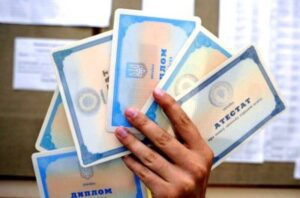
On September 27, shareholders of IC Veltliner (Kyiv) will consider granting the Supervisory Board the authority to give consent to transfer assistance for the needs of the Armed Forces of Ukraine within 15% of the amount of actually collected insurance payments for voluntary personal types of insurance for the period from September 27, 2022 until the date of decision by the Supervisory Board.
According to the agenda of the meeting of shareholders, published in the information disclosure system of the National Securities and Stock Market Commission, shareholders also plan not to distribute profit for 2021, not to accrue or pay dividends to shareholders, to make deductions to the reserve fund of 5% of profit for the year in the amount of UAH 73.9 thousand hryvnia and allocate UAH 1.404 million for current expenses of economic activity.
As reported, IC Veltliner has been the legal successor of PJSC European World Insurance House since 2012. It has 28 licenses for voluntary and compulsory types of insurance, and offers customers more than 100 insurance products.
From the second half of 2021, the teams of IC Veltliner were joined by the teams of three other insurance companies, of which one insurer left the market of its own accord, another was sold and changed its specialization.

The ship Sormovskiy 121 from the port of Chornomorsk and the bulk carrier Star Laura from the port of Pivdenny (both in the Odessa region) formed the fifth caravan with Ukrainian agricultural products, the Ministry of Infrastructure of Ukraine reported on Facebook on Friday.
According to his release, the total tonnage of the caravan is over 63,000 tons.
“Star Laura became the first Panamax-class ship to leave the port of Pivdenny since the beginning of the “grain initiative”, and the third in the general list of giant ships that sailed along the “grain corridor,” the ministry noted.
The Ministry of Infrastructure also indicated that “Chernomorsk” and “Pivdenny” will take two more ships for loading – Brave Commander and Petrel S, which will be loaded with more than 40 thousand tons of grain.
As reported, on July 22, 2022, in Istanbul, representatives of Ukraine, Turkey and UN Secretary-General António Guterres signed the Initiative for the safe transportation of grain and food from the Ukrainian ports of Odessa, Chornomorsk and Pivdenny.
As part of the implementation of the agreements, 12 ships with agricultural products have already left Ukrainian ports for seven countries of the world with 370,000 tons of agricultural products, while two ships entered Ukrainian ports.

Ministry of Education and Science has published an algorithm of actions for applicants with a foreign document on education.
“SE” Inforesurs “provides an algorithm of actions for applicants who received education abroad. If you apply on the basis of a foreign document of education, you can only apply in paper form directly to the university. For further education and obtaining a diploma, an applicant must go through the procedure for recognizing a foreign document in Ukraine,” the ministry’s press service said.
The Ministry of Education notes that for this it is necessary to apply to the ZVO after enrollment during the first month of study, and the institution must make a decision by the beginning of the second semester of the first year of study.
“If confirmed, a certificate of recognition of a foreign document of education is issued, information about which is entered in the Unified State Economic Educational Institution. Please note that such a certificate is valid only at the university that issued it,” the ministry said.
In addition, you can contact the State Enterprise “Information and Image Center” of the Ministry of Education, where, upon recognition of the document, a certificate is issued, information about which is entered in the Unified State Economic Education and Educational Institute, and which is accepted in all educational institutions, enterprises, institutions, organizations of any form of ownership.
“Certificates issued by both the university and the Ministry of Education and Science are valid only together with the original document and are valid indefinitely,” the ministry informs.
Among other things, the Ministry of Education reported that recognition procedures do not require documents on the education of citizens of the former USSR, issued before May 15, 1992, as well as documents issued on the basis of training before the start of the 1992/1993 academic year in educational institutions of the states of the former USSR.
National bank of Ukraine’s official rates as of 12/08/22

Source: National Bank of Ukraine

The lowest corn harvest since 2007-2008 is expected in the countries of the European Union, which is caused by an abnormal drought that has gripped the main corn-producing countries in the past few weeks.
Against this background, the EU imports 13 million tons of corn from Ukraine to cover its needs, according to the website of the electronic grain exchange GrainTrade with reference to the report of the chief analyst of Argus Media (France) Nathan Cordier, which he announced during the meeting of grain traders “Trend and Hedge Club”.
According to him, Bulgaria, Romania and Hungary are the largest corn producers in the EU, and production performance in these countries will be disappointing in 2022.
“We expect Romania to harvest 8 million tons of corn, Hungary 4.5 million tons, and Bulgaria 15 million tons. These countries exported corn to Spain, Italy and Turkey, which were the main markets. low harvest in Brazil, exported grain to the Middle East and North Africa. This season, we expect that the supply of exports will be low,” GrainTrade quoted Cordier’s report as saying.
The expert noted that three heat waves have occurred in France since the beginning of corn sowing, so its harvest is expected at 11.2 million tons, and will be harvested from only 68% of the area. Thus, the yield of corn in France will be only 8 tons / ha, which is the worst result of the country in the last 20 years.
According to Cordier’s forecasts, Europe will be forced to import 23 million tons of corn to cover its needs, of which it will import 13 million tons from Ukraine, and another 5 million tons from Brazil.
As reported, the Minister of Agrarian Policy and Food Mykola Solsky in early August announced an increase in the forecast for the harvest of grain and oilseeds in Ukraine this season by approximately 5-7 million tons – up to 65-67 million tons from 60 million tons.
At the same time, in the July report, the US Department of Agriculture forecasts the harvest of Ukrainian wheat in the 2022/2023 marketing year (MY, July-June) at the level of 19.5 million tons, its export – 10 million tons, domestic consumption within the country – 10.2 million tons. The corn harvest is estimated at 25 million tons, export – 9 million tons, domestic consumption – 10.7 million tons.
In early July, the Ukrainian Grain Association (UGA) increased the forecast for the harvest of grain and oilseeds in Ukraine in 2022 by 4.4% compared to the May forecast – up to 69.4 million tons from 66.5 million tons.
According to her forecasts, in 2022, a wheat harvest is expected at the level of 20.8 million tons (+ 8.3% compared to the organization’s May forecast); 27.3 million tons of corn (+4.6%); 6.6 million tons of barley (forecast kept); 9 million tons of sunflower (forecast kept); 2.2 million tons of soybeans (+4.7%); 1.5 million tons of rapeseed (+13.3%).